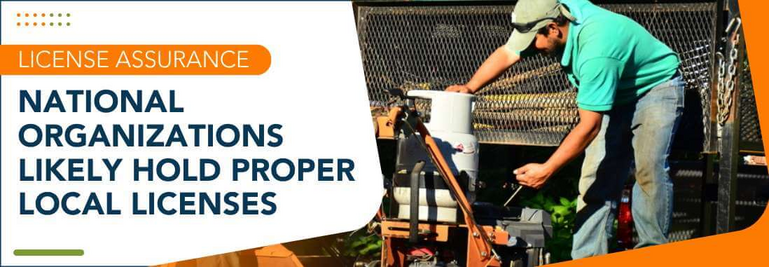How To Get a Professional Certified Pesticide Applicator

How To Hire a Certified Pesticide Applicator.
Whether used to control pests or weeds,
Pesticides are dangerous; we all know that.
Pesticides are even more dangerous when applied commercially.
This is why pesticides should only be applied by businesses holding a Pesticide Applicator License.

No doubt about it, If not properly applied there pesticides could cause serious consequences.
During my 15 years as a lawn care service professional, I have observed companies flying below the radar.
This typically occurs when a homeowner contracts lawn mowing guy to also spray for weeds, or treat for insect infestation.
Unless using natural solutions, hiring someone without proper training and licenses in place could be dangerous.
Most people don't know this... Lawn mowing, and lawn care are two different disciplines.
So why exactly, is it so important for your lawn service provider to have the property license in place before spraying dangerous pesticides and herbicides?
And how do you get a professional pesticide applicator.
Let’s find out...
Obtaining a Pesticide Applicator License, is a rigorous process for the lawn care professional.
The company will have to pass an extensive set of regulations, which;
- Require passing exams, which make sure the lawn care service provider has the knowledge base for proper application and safety.
- Require the company will also have to implement and maintain a proper level of insurance.
- In most jurisdictions subject pesticide applicators to at least an annual inspection by the state to check record keeping, proper safety procedures, and if any violations were made.
- And require Pesticide license holders to undergo continuing education and re-examination.
As if that weren't enough, if a company receives too many complaints or violations, they will lose their license.
This is an essential function to hold service providers accountable, and make them overall better professionals for their customers.
This is all to protect the environment and the public, and for your kids sake. These checks and regulations make sure the companies and technicians applying pesticides are qualified and properly following the laws and regulations.

So how do you know if the company servicing your lawn, or your neighbor’s property has the proper licenses in place?
Here are a few ways to find out:
- There is no national registry for licensed pesticide applicators; however, a local internet search for “licensed pesticide applicators” will steer you in the right direction. Call the extension office and check; many have published online the licensed companies in your area.
- The easiest way may be to simply ask the owner or representative to provide a copy of their charter or license.
- Check the company’s vehicle. In most areas, companies applying pesticides are required to display their company license number on both sides of the vehicle. Take the number down, and it would be a good idea to confirm it with your local regulatory body.
- If you can not find the information anywhere else, call your local governing body that handles the regulation of commercial pesticide use. Usually this is your local agriculture department

When working with large operations:
If you are working with a national organization, it’s highly likely they have the proper local licenses in place.
Heres the Deal: I would strongly encourage asking to the see the certification for the actual applicator conducting the services at your property.
Many large scale organizations have high turnover and do not keep their employees long. I have spoken with many customers over the years about their experiences working with large scale companies. In many cases, they would see 4 or 5 different applicators in a given year.
It is often the case that a new technician will be hired and begin training to pass the applicator test. In many cases he will not remain with the company long enough to get the certification card.
The company will then hire another tech, throw him out in the field, and the cycle continues.
Having a licensed applicator is just as critical, as the company being properly licensed. The technician at your property is actually performing the work, it is imperative that he has been trained on proper safety and application and that he be verified by your state.
TLDR: Hire a licensed pesticide applicator for your lawn!
Why? | How to check? |
1. Pesticides are dangerous, especially when applied wrong. | 1. Ask the company for their license. |
2. Unlicensed companies might not know how to apply them safely. | 2. Look for their license number on their vehicles. |
3. Licensed companies have to pass exams, carry insurance, and follow strict rules. | 3. Call your local agriculture department. |

In conclusion
Don’t risk your lawn or family’s safety by working with a company flying below the radar.
There will be several quality, licensed services providers in your area to keep your lawn and landscape in top notch shape.
Should you find a contractor performing lawn care services include chemical applications, it may be prudent to report them to your governing agency.
The agency will give them an initial warning and then take action should the unlicensed contractor persist.
As it turns out, this is necessary for public safety, and the service provider will also be better for it.
You can learn more about Pesticide Applicator Licensing here
If you don't want to use pesticides try these organic solutions.



 Share
Share











